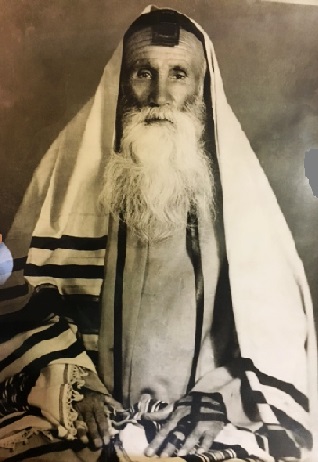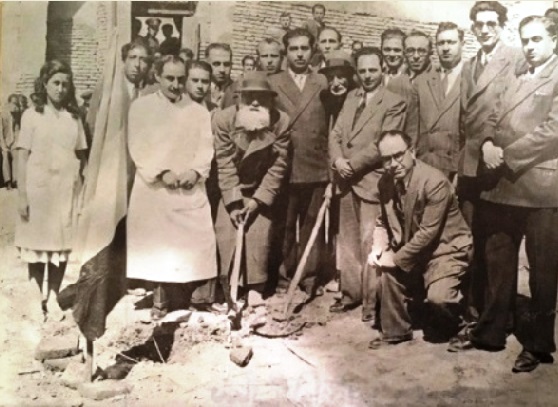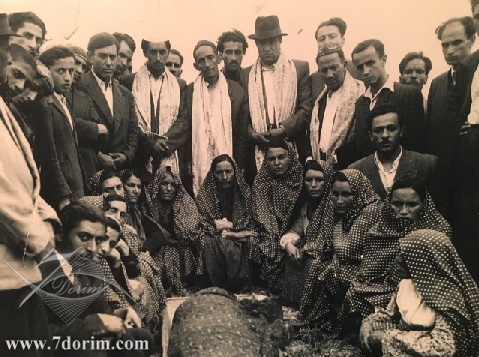The article below is being re-printed, with permission, from 7dorim.com. 7dorim, which was founded and is maintained by Mr. Yousef Setareh-Shenas, is an indispensable resource for anyone wanting to learn more about Judeo-Persian history, culture, language and customs. The original article can be found via this link.

Yeshoua Yehazghel Yadegar, was born in the year 1866 to a religious Jewish family of Tehran. His father Yehazghel (Ezekiel) Yadegar was a trusted member and a philanthropist figure of the Sar-e Chal Jewish neighborhood of Tehran. Weak in literacy himself, he sent the little Yeshoua, to study Hebrew at the maktab or traditional school of Mullah Abraham, the greatest dayyan or Jewish religious arbiter of his days, and the Head of the Chebra, the seed of Tehran Jewish Association.
The young Yeshoua demonstrated an ample gift in learning the Torah subjects. He presented commentaries on the Gemara and Shulchan Aruch, and he emerged ahead of his classmates. Consequently, he was soon chosen as cantor to lead the Chadash (New) Synagogue. He went on to serve for years as the cantor of the said synagogue, reciting the Torah and leading the prayers on the Shabbats, High Holidays and other special occasions. In the early 1890’s the young Yeshoua joined a caravan and made pilgrimage to the Western “Wailing” Wall, Jerusalem. He achieved this honor at the time by making the long journey on foot, without any cars or other vehicles.
Hadj Yeshoua — having earned the title hadji or hadj for completing pilgrimage to Jerusalem — began his philanthropic activities early in life. As a young man, he had chosen to devote his professional life to winemaking, which was a common profession for the Jews of Iran. Although he did so to make a living, he always put the spiritual side of his profession above the material considerations. For instance, he never served drinks “by the cup” at his location; he always chose the best harvest for his products; and he pursued his job with particular passion and discipline. Hadj Yeshoua loved his profession. He believed that what he did was holy, and that he was doing a great mitzvah or “good deed” for his fellow Jewish people. It should be noted that in that period, many Jewish families of the Oudlajan Jewish ghetto of Tehran made and stored their own wine for the year, and some of them made a living by selling the wine. Hadj Yeshoua had housed in his cellar, beneath the courtyard of his home, more than 40 khomreh-s (clay barrels), large and small, dedicated to wine production. Every year he provided the wine to the synagogues and families for use on the Shabbats, High Holidays and other ceremonies, such as the brith milah or “ritual circumcision”, the chupah or wedding ceremonies, and other religious occasions. Later on, as he expanded his business to produce the Persian brandy known as the raisin aragh for the weddings and other celebrations, he used several large samavars as distillation devices, using the raisin laid in water to produce the kosher brandy.
Before long, Hadj Yeshoua was producing vintage wine with great aroma and aftertaste, as well as some top-notch transparent brandy, known in the Persian slang as aragh-e zanjireh-dar — for the “chain of the bubbles that formed on the liquor” (cf. the Dehkohda), a sign of the high quality clear liquor usually made from raisins — which he decided to sell at fair prices. He sold each 1-charak bottle of wine for 2 rials of the time, and every 7.5-seer bottle of raisin brandy for 2 rials, provided the buyer would return the bottles.(Charak and seer are among Persian units of weight or volume).
Alongside his business, Hadj Yeshoua Yadegar more or less carried on his philanthropic pursuits. Most days, from early in the morning until afternoon, he was occupied by professional obligations. After lunch and a short siesta, he left home for the Grand Bazaar of Tehran, visited the Jewish businesses of the Bazaar, Nasser-Khosrow and Lalehzar areas, and asked to collect tzedakah or “donations” for the poor. Gradually, these visits became more serious, and over time, a number of other philanthropic figures joined him in the cause. Among them were Dayee Yaghoub (Uncle Jacob) Matzahband, Nissan Layee, Meir Ghoulian, Agha-Jan Bakhshi, the supervisor of the Beheshtieh “Eden” Jewish Cemetery at the Fouzieh Square, Eliahu Broukhim, Agha-Jan Hanukah, Asher Eliahu Hakkak “Pirouzian”, Pinchas Ezra Sharaf, and Yousef “Joseph” Bakhshi. The Jewish community knew of Hadj Yeshoua and friends’ philanthropic aims, and more or less they offered him what help they needed.
During World War II, and especially through a period of famine, the Nik-Khah “Philanthropist” Association received humanitarian aid via international organizations, and it was put in charge of providing the poor with donations and warm meals. Hadj Yeshoua, who very well knew the poor and strapped families of the Oudlajan Jewish neighborhood, collaborated productively with the said philanthropic association. To that end, he secured a large cart and secretly delivered all the goods that were needed, including home appliance, mattresses, comforters or duvets, blankets, clothing items, food and more, to the families in need.
He performed good deeds indefatigably. Especially during the High Holidays and the mo’adim, he did all he could with a wonderful spirit to provide what was needed for the occasion, and to deliver them personally to the honorable yet impoverished families. On many occasions, he provided the dowry for the girls who were ready to be married, and when necessary, he provided for the cost of the weddings for many young couples. Hadj Yeshoua was against the poor begging for money, and as such, he gave them every week 2 or 3 qerans, a currency of the time, for expenses. Many times poor people came to him from the other Iranian towns asking for financial assistance. Not only did he provide them with what was needed, but also he bought the return tickets for them to get back home safely. He also helped those who migrated to Tehran for work, but who had no place to live, by providing them with furnished rooms in synagogues, the Ezra Yaghoub “Jacob” Synagogue, in particular. He also paid them for the expenses and took care of them until they had settled and were back on their feet.
It should be noted that Hadj Yeshoua’s philanthropic activities were not limited to the Jewish minority. On occasion, and so far as he could, he helped people in need who belonged to the other sectors of the society. Hence, he came to be known by his Muslim friends as “Hadj Abdollah”, i.e. “The Servant of God.” Another of Hadj Yeshoua’s philanthropic endeavors involved performing the funeral and internment services for the deceased Jews according to the halachah, i.e. the Jewish religious law and tradition. He was also responsible for helping the widowed, the orphans, and the large impoverished large families.
After a lifetime of selfless public service, Hadj Yeshoua Ezekiel Yadegar passed away in the spring of 1952 (Iyar 5711) at the age of 88. In following his Will, his body was interned in the Guilliard Jewish Cemetery in the north of Tehran. In paying respect to the loss of this righteous man, the Jewish schools were closed. A large number of Jews from all walks of life, from the merchants of the Bazaar to the clerics, physicians, members of the cultural institutions, members of the synagogues, members of the Jewish Association, the personnel of the Kanoon-e Kheyr-Khah (Philanthropy Center), and more, traveled to attend the funeral at the Guilliard Cemetery, located in the city of Damavand in the north of Tehran.
Hadj Yeshoua Yadegar married twice, the first of which was to a girl named Zulaykha. The couple brought two sons and two daughters to the world. Sadly, the marriage ended after 14 years, when his wife died from an incurable disease. He then married a divorcée named Senoubar (Poplar), who hadn’t been able to bear a child in her first marriage. The couple brought six daughters and a son to the world. Among his children, his son Nejatollah Yadegar was already known at 13 as a cantor with a beautiful voice, and he went on for years to serve as a cantor at the Pol-e Choubi (Wooden Bridge) and Darvazeh Doulat (a.k.a. Rouhi-Shad) Synagogues. He also followed his father’s path in his active pursuit of philanthropic endeavors. He and other members of the Yadegar family played a large role in building the Pol-e Choubi Synagogue.
Throughout his life, Hadj Yeshoua Yadegar ran into many ups and downs, and he tasted much bitterness. Yet none of that hardship could derail him the least in his philanthropic pursuits. If at all, those difficulties resulted in establishing the first official public welfare institution of the Jewish community ever since that period. Afterwards, the path set by Hadj Yeshoua and his caring friends were followed by the coming generations of philanthropists, including the late Shemuel (Samuel) Yadegar. Such benevolent activities are carried on today in the body of the Kourosh (Cyrus) Philanthropic Organization, a nonprofit institution overseen by Eskandar (Alexander) Michael, which serves the Jewish families in need.



Recent Comments